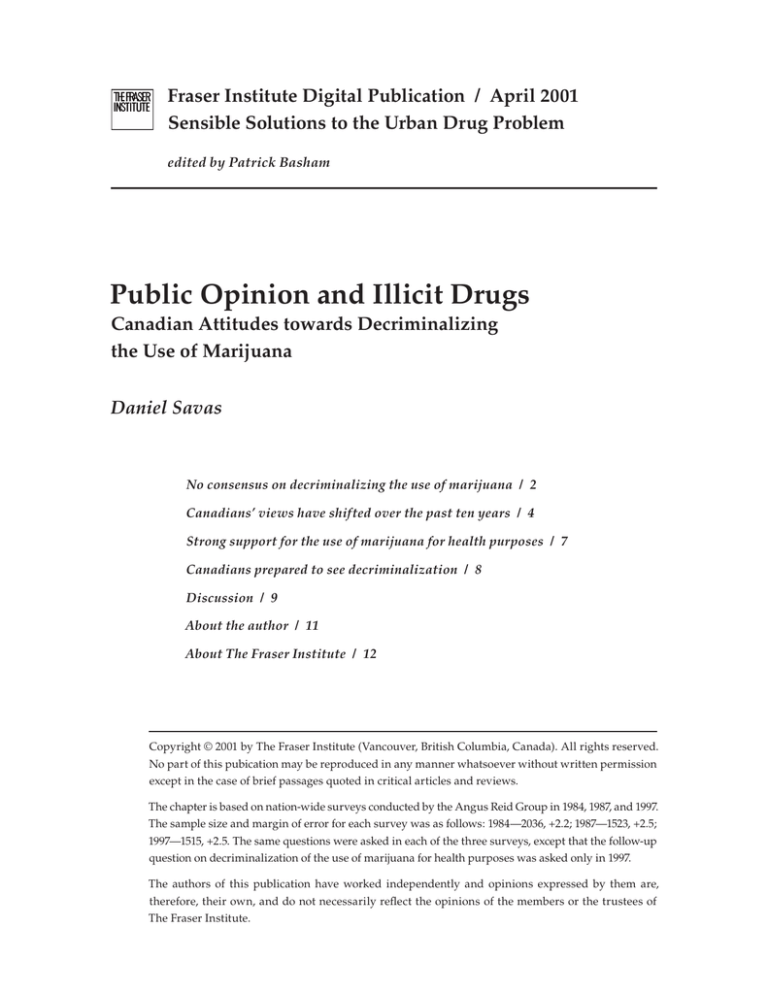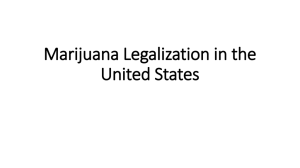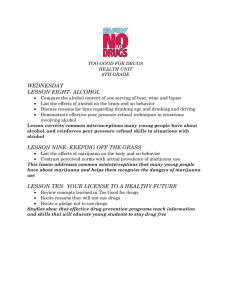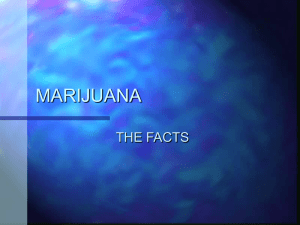
Fraser Institute Digital Publication / April 2001
Sensible Solutions to the Urban Drug Problem
edited by Patrick Basham
Public Opinion and Illicit Drugs
Canadian Attitudes towards Decriminalizing
the Use of Marijuana
Daniel Savas
No consensus on decriminalizing the use of marijuana / 2
Canadians’ views have shifted over the past ten years / 4
Strong support for the use of marijuana for health purposes / 7
Canadians prepared to see decriminalization / 8
Discussion / 9
About the author / 11
About The Fraser Institute / 12
Copyright © 2001 by The Fraser Institute (Vancouver, British Columbia, Canada). All rights reserved.
No part of this pubication may be reproduced in any manner whatsoever without written permission
except in the case of brief passages quoted in critical articles and reviews.
The chapter is based on nation-wide surveys conducted by the Angus Reid Group in 1984, 1987, and 1997.
The sample size and margin of error for each survey was as follows: 1984—2036, +2.2; 1987—1523, +2.5;
1997—1515, +2.5. The same questions were asked in each of the three surveys, except that the follow-up
question on decriminalization of the use of marijuana for health purposes was asked only in 1997.
The authors of this publication have worked independently and opinions expressed by them are,
therefore, their own, and do not necessarily reflect the opinions of the members or the trustees of
The Fraser Institute.
Public Opinion and Illicit Drugs
2
Public opinion and illicit drugs
“Tune in, Turn on, Drop out.” This magical phrase that encapsulated the mood of an
entire generation now seems a distant memory. If you were born as part of the post1970’s wave, some time after acid rock, disco, and skin heads, the name Timothy Leary
might not really conjure up anything of great substance. With the recent death of this
icon of the 1960s, one might even be ready to close the book on the Now Generation,
and forget that Leary & Co. had a great impact on the social mores and values of the
time. This is no more evident than in Canadians’ views on the decriminalization of the
use of marijuana.
Canadian public opinion on decriminalization of the use of marijuana has shifted quite
dramatically over the past decade. Despite remaining divided about whether or not the
use of marijuana should be a criminal offence, Canadians have moved from majority
opposition to decriminalization to majority support for it. And, when pushed to consider its use for health purposes, the Canadian population opens the decriminalization
door even further, leaving only a very small minority staunchly opposed to taking it off
the list of criminal offences for any reason.
Views on the decriminalization of the use of marijuana are not shared consistently across
all groups in Canadian society, however. In particular, generational and gender gaps are
shaping public opinion on this issue. The generation of the 1960s—the aging “boomers”—
appear to be driving a growing liberal view of marijuana use, an attitude that is being
passed on to their children.
No consensus on decriminalizing
the use of marijuana
There is currently no real consensus among Canadians about whether or not the use of
marijuana should be a criminal offense. A slim majority—51 percent—favours decriminalization while fully 45 percent believe that the use of marijuana should remain illegal.
Another four percent do not have an opinion one way or the other (figure 1).
The absence of a nation-wide consensus hides some real differences across different
population groups, however. Indeed, views on the decriminalization of the use of marijuana, unlike views about many other public-policy issues, are specific and strong predictors that have not changed very much over the past decade. Whether a given individual is more or less apt to support decriminalization varies by age, gender, education,
and region (figure 2).
Fraser Institute Digital Publication / April 2001
Sensible Solutions to the Urban Drug Problem
Public Opinion and Illicit Drugs
3
Sh
ou
in
ma
re
al (45%)
illeg
Shoul
db
el
)
1%
5
(
ld
eg
al
Figure 1 Canadians’ perspectives on decriminalizing the use of marijuana (October 1997)
Question 1 Some people say that smoking marijuana should not be a criminal offence while others say
it should. What is your opinion? Should smoking marijuana be a criminal offence or not?
Don’t know (4%)
Overall, younger and middle-aged Canadians—those under 55 years of age—hold more
liberal views on decriminalization of the use of marijuana than do those over the age of
55 years. Similarly, while a solid majority of Canadian men think marijuana use should
be legal, fewer women in the population share this view.
Education is also a good predictor of opinions on the decriminalization of the use of
marijuana. Canadians with more formal education tend to be more open to decriminalization than those who have not completed high school.
When one looks at the Canadian population by regions, British Columbians are far and
away the stand-outs in an otherwise cautious Canadian population, perhaps confirming the stereotype that British Columbia is a Lotus Land inhabited by the free-spirited.
Fully 63 percent of people on the West Coast support decriminalization, compared to
about half of Ontarians and Quebeckers, fewer residents of the Prairie provinces, and a
mere 37 percent of Atlantic Canadians, the most conservative.
Fraser Institute Digital Publication / April 2001
Sensible Solutions to the Urban Drug Problem
Public Opinion and Illicit Drugs
4
Figure 2 Canadians’ perspectives on decriminalizing the use of marijuana (October 1997)
—percent across population segments that supports decriminalization
Region
British Columbia
Alberta
Manitoba & Saskatchewan
Ontario
Quebec
Atantic Provinces
Gender
Men
Women
Age
18–34
35–54
55+
Education
Less than High School
High School
Some post-Secondary
University Graduate
0%
10%
20%
30%
40%
50%
60%
70%
Canadians’ views on decriminalizing the use of
marijuana have shifted over the past ten years
Public opinion in Canada on the debate over decriminalization has undergone a marked
reversal over the past decade. Generally, views on use of marijuana were notably more
conservative in the mid-1980s but have since experienced a real and significant liberal
shift. Significantly, however, the long-term trendline resembles more a seesaw than a
straight line, suggesting that views are anything but stable. What is particularly notable is
Fraser Institute Digital Publication / April 2001
Sensible Solutions to the Urban Drug Problem
Public Opinion and Illicit Drugs
5
the fact that shifts in opinion have occurred consistently across most population groups,
implying that, on this particular issue, no one group in Canadian society is immune to
broader social trends and ideologies.
Current views on the use of marijuana are noticeably more favourable to decriminalization than they were 10 years ago. Back in 1987, during the heyday of Ronald Reagan’s
“War on Drugs” and media coverage of increases in drug use and abuse, Canadians were
somewhat more reluctant to support the idea of decriminalizing marijuana use. In fact,
a majority—54 percent—opposed this move, while 39 percent thought that use of marijuana should no longer be a criminal offence. Three years earlier, in 1984, a poll by the
Angus Reid Group found the reverse picture: 51 percent of Canadians supported decriminalization, while 42 percent opposed it (figure 3).
In the space of 13 years, then, Canadian public opinion on decriminalizing the use of
marijuana has changed twice, once towards a more conservative position and then, more
recently, back to majority support for decriminalization. This volatility would not be so
significant were it not for the fact that there is a high degree of consistency in the shifts
across most population groups. The sole exception, interestingly enough, is age (table 1).
Figure 3 Changing views on decriminalizing the use of marijuana (May 1984–October 1997)
60%
50%
40%
30%
Should remain illegal
Should be legal
20%
10%
0%
May 1984
November 1987
October 1997
Fraser Institute Digital Publication / April 2001
Sensible Solutions to the Urban Drug Problem
Public Opinion and Illicit Drugs
6
Table 1 Canadians’ opinions about decriminalizing the use of marijuana (across
population groups; May 1984 to October 1997) Percent who feel that the use of
marijuana should not be a criminal offence
May 1984
November 1987
October 1997
Region
British Columbia
Prairies
Ontario
Quebec
Atlantic
55%
46%
51%
55%
39%
40%
37%
32%
51%
38%
63%
44%
51%
54%
37%
Gender
Men
Women
58%
43%
43%
36%
59%
44%
Age
18–34 years
35–54 years
55+ years
40%
49%
35%
44%
42%
29%
56%
54%
41%
Education
Less than high school
High school graduate
More than high school
33%
48%
59%
32%
40%
43%
46%
49%
53%
The generation gap shifts in unison with Canadian public opinion as a whole. However,
while there continued to be definite differences between young and old across the full
period, there has been an overall “softening” of views on decriminalization across all
age groups, which suggests quite strongly that age may be the key variable driving public opinion on the decriminalization of marijuana use. We see this in two ways.
Firstly, the proportion of young Canadians who support decriminalization has risen consistently since 1984 from 40 percent to 56 percent and without the “conservative” dip in
1987 experienced by all other age groups. In dramatic contrast, both middle-aged and
older Canadians were caught up in the shift towards more conservative views on this
issue in the mid-1980s.
Secondly, and just as important, despite the consistently wide gap in support for decriminalization between those over and those under 55 years of age, the overall trend on this
issue is one of growing support at all age levels. Even among Canadians over 55 years
Fraser Institute Digital Publication / April 2001
Sensible Solutions to the Urban Drug Problem
Public Opinion and Illicit Drugs
7
of age, there has been a gradual shift towards support for decriminalization: support
levels have moved from 35 to 41 percent over the past 13 years, despite being as low as
29 percent in 1987.
Looking at the results be region, we find that even in British Columbia, the most liberal
of Canadian provinces on this issue, there was a significant dip in public support for
decriminalization in the mid-1980s, from 55 percent in 1984 to 40 percent three years
later, and then a dramatic rebound to the 63 percent support today. A similar situation
occurred in Ontario and on the Prairies. Only in Quebec and the Atlantic provinces
have opinions remained constant over the past decade and a half.
The gender gap, so present in 1997, seems to be a permanent fixture in public opinion on
decriminalization of the use of marijuana: men remain stronger supporters of decriminalization. The 15-point gap separating men and women in 1997 is mirrored in findings
for both 1984 and 1987.
Education is today a less powerful predictor of views on decriminalization than was
the case in the early to mid-1980s. In 1984, the more formal education one had, the greater the likelihood of support for decriminalization. By 1997, the gap between the most
and least educated Canadians had shrunk quite dramatically, from 26 percentage points
over a decade ago to only 7 points today, making it extremely difficult to say with any
degree of confidence that education helps form views on decriminalization.
Strong support for the use of marijuana
for health purposes
Canadians initially opposed to the decriminalization of the use of marijuana seem to
change their opinions quite dramatically when it is a question of using it for health
purposes. This suggests that opposition to decriminalization is not single-minded
and opens up doors to restricted use of the now-banned substance under controlled
circumstances.
Overall, 71 percent of Canadians initially opposed to decriminalization say that the
use of marijuana should not be a criminal offence when it is used for health purposes.
About one-quarter (27 percent) remain staunchly against decriminalization even under
these conditions (figure 4).
Those who hold the most conservative views on decriminalization—even in health-related cases—include Albertans (38 percent), Québecois (34 percent), young people (31 percent), Canadians with less than a high-school education (36 percent), and those who live
in low-income households.
Fraser Institute Digital Publication / April 2001
Sensible Solutions to the Urban Drug Problem
Public Opinion and Illicit Drugs
8
gal
(27%)
al for health
lle
e le g
re
Don‘t know (2%)
b
uld
o
Sh
)
1%
7
(
Sho
uld
ni
ai
m
pu
rp
os
es
Figure 4 Views among those otherwise against decriminalization on decriminalizing the
use of marijuana from health reasons
Question 2 (Asked in 1997 only of those who answered “Yes, criminal offence” to Question 1) Some
people use marijuana for certain health-related purposes—for example, some patients feel it is helpful
for pain relief. Do you think marijuana should be a criminal offence even for health-related use or should
it be legal to use it for health-related purposes?
Canadians prepared to see decriminalization of the use
of marijuana, if only under certain circumstances
Stepping back to look at the different options related to the use marijuana, we find that
the Canadian population today is generally supportive of the decriminalization of marijuana use, even if, for many, this support is for use under certain circumstances, such as
for health purposes.
When we combine views on outright decriminalization and decriminalization for healthrelated reasons, we find that only about one Canadian in ten is staunchly against seeing
the use of marijuana removed from the list of criminal offences. By comparison, a full
32 percent would be prepared to accept decriminalization in instances where healthcare
was an issue. A slim majority supports outright decriminalization (figure 5)
Generally speaking, opposition to decriminalization under any circumstances is strongest in Alberta (20 percent). This conservative view also tends to be more entrenched
Fraser Institute Digital Publication / April 2001
Sensible Solutions to the Urban Drug Problem
Public Opinion and Illicit Drugs
9
Figure 5 Options on the use of marijuana (October 1997)
Findings from the follow-up question on the use of marijuana for health purposes only were recalculated as
a percentage of the natural population. This affected only the 45% initially opposed to decriminalization.
It should not be a criminal offence
It should be legal for health purposes only
It should remain illegal
Don't know
0%
10%
20%
30%
40%
50%
60%
among Canadians with less formal education and those living in lower-income households, although the differences are not statistically significant.
Having the option of decriminalization of the use of marijuana for health purposes
reveals a softening of views in many quarters. This is most true regionally, where, in
Atlantic Canada, a full 41 percent of people choose this option, slightly more than those
who support decriminalization outright (36 percent). And, 36 percent of older Canadians (55 years and older) would accept use of marijuana for health purposes, confirming
earlier observations of a softening of views among people in this age category.
Discussion
Canadians’ opinions on the decriminalization of the use of marijuana have shown
some degree of volatility over the past decade and a half. Moreover, there does not
appear to be any large degree of consensus among Canadians as to whether or not the
use of marijuana should remain a criminal offense. This volatility and the absence of
a consensus does, however, mask some fundamental shifts in perspectives on decriminalization among certain population groups. These shifts suggest a gradual softening
of views on this issue. The more liberal positions on decriminalization seem to reflect,
first, the flowering of the “boomer” culture of the 1960s and, second, an openness to
looking at the use of drugs beyond the boundaries of personal indulgence and more as
a potentially useful instrument for the social good at some level. There are a number
of specific observations that grow out of these more general trends.
Fraser Institute Digital Publication / April 2001
Sensible Solutions to the Urban Drug Problem
Public Opinion and Illicit Drugs 10
Firstly, our survey findings clearly indicate that the issue of the use of marijuana is
very much generational: older Canadians tend to be more opposed to decriminalization
while the younger generation are more in favour of it. More specifically, it is the “babyboomer” generation and their children who appear to be driving support for decriminalization. This may not be too surprising given that personal experience with marijuana grew exponentially during the 1960s; it is simply not a highly debatable issue for
people of that generation because drugs were part of the culture of the times. This does
not mean that everyone was “doing the stuff,” just that their experience of the use of
marijuana and of drugs more generally put them in a unique situation of being able
to differentiate between “hard” and “soft” drugs. While it is difficult to say with any
degree of confidence how much of this sensitivity baby boomers have passed on to their
children, our findings show that, while “Mom and Dad may not have inhaled,” young
people today are certainly more liberal in their views about the use of marijuana than
was the case a generation ago.
Secondly, one has to put attitudes towards the use of marijuana within the context of
perceptions of criminality and of what constitutes a crime. Ultimately, the generally liberal views on the use of marijuana suggest that Canadians perceive different “layers” of
crime. To use an extreme example, smoking a joint is just not the same thing as murder.
More to the point—arguments for the “slippery slope” aside—smoking a joint may not
be, for most people, as serious as snorting cocaine, free-basing, or shooting up heroine.
Consequently, to make the use of marijuana a criminal offence on the same level as any
of these other examples seems to be pushing the boundaries of acceptability. Given the
prominence of the use and abuse of the more serious “hard” drugs, the assault on drugs
like marijuana may indeed seem less of a priority than it was years ago.
Further, being a “pusher“ selling marijuana to young people is dramatically different
from using the drug in the confines of one’s home for personal indulgence. Our findings
in no way suggest that Canadians think that users of marijuana should be given carte
blanche as far as personal use is concerned but the level of intent and criminality of its
use are part of the mix of perceptions about decriminalization.
Thirdly, the fact that the use of marijuana for health purposes “softens” opposition to
decriminalization is indicative of a growing societal openness to alternative ways of
doing things. For example, in the health-care field, a national survey in August 1997
found a relatively high degree of use of alternative medical therapy in Canada, suggesting that alternative medicine is quickly moving into the mainstream of Canadians’ health-care practices (Canadian Public Opinion on Alternative Medecines and Practices, CTV/Angus Reid Group poll). In this light, viewing marijuana as a drug that
“can help” (e.g. pain relief, glaucoma) seems to lift the dark cloud hanging over it, especially among those opposed to decriminalization. Moreover, its use as a health-care
Fraser Institute Digital Publication / April 2001
Sensible Solutions to the Urban Drug Problem
Public Opinion and Illicit Drugs 11
“remedy” contradicts the notion that its use is a criminal offence: if it is good for you,
why should someone who uses it be a criminal?
Lastly, one needs to put the decriminalization of the use of marijuana into the context
of a public that may well be uninformed about the debates about the more general use
of drugs. The shifts in opinion we have found overall and the differences in views on
marijuana depending upon what it is used for strongly suggest the issue is far from
black and white for most people. As attitudes grow more liberal, there is a clear need
and opportunity to focus the debates, educate the public, and move away from the hysteria of Reefer Madness and towards some enlightened discussion of the appropriate
measures to apply to the drug issue in Canada.
About the author
Daniel Savas is Senior Vice-President of the Angus Reid Group's Vancouver Public
Affairs office He is a public-affairs specialist, doing work for clients in both the private
and the public sectors. He holds a Ph.D. in Political Science from the University of British Columbia, an M.A. from Université Laval in Quebec City, and a B.A. from the University of Toronto. Dr Savas has also studied at the Institut d’Études Politiques in Paris,
from which he received a D.E.A., and Essex University in England, where he studied
data analysis.
Mr. Savas’ professional and academic background includes expertise in public policy
and communications research for a wide variety of clients in the public and private sectors. As Senior Vice-President, he has conducted studies in British Columbia and Canada, looking at public opinion on a diverse number of topics, including education, immigration, and refugees; multiculturalism, national unity, and bilingualism; perceptions
of business and labour; the role of government; corporate image and reputation and corporate community involvement; aboriginal affairs; youth and government; health care;
and environmental and land-use issues.
Fraser Institute Digital Publication / April 2001
Sensible Solutions to the Urban Drug Problem
About The Fraser Institute
The Fraser Institute is an independent Canadian economic and social research and
educational organization. It has as its objective the redirection of public attention to
the role of competitive markets in providing for the well-being of Canadians. Where
markets work, the Institute’s interest lies in trying to discover prospects for improvement. Where markets do not work, its interest lies in fi nding the reasons. Where competitive markets have been replaced by government control, the interest of the Institute lies in documenting objectively the nature of the improvement or deterioration
resulting from government intervention. The work of the Institute is assisted by an
Editorial Advisory Board of internationally renowned economists. The Fraser Institute is a national, federally chartered, non-profit organization fi nanced by the sale of
its publications and the tax-deductible contributions from its members, from foundations, and from other supporters; it receives no government funding.
Membership
For information about becoming a member of The Fraser Institute, please contact the
Development Department via e-mail: membership@fraserinstitute.ca; via telephone:
604.688.0221 ext. 586; via fax: 604.688.8539. In Calgary, please contact us via e-mail:
paulineh@fraserinstitute.ca; via telephone: 403.216.7175; via fax: 403.234.9010. From
Toronto, please telephone 416.363.6575 or fax 416.601.7322.
Media
For media enquiries, please contact Suzanne Walters, Director of Communications,
via e-mail: suzannew@fraserinstitute.ca; via telephone: 604.714.4582 or, from Toronto,
416.363.6575 ext. 582.
Ordering publications
For information about ordering the printed publications of the Fraser Instiute, please
contact the book sales coordinator via e-mail: sales@fraserinstitute.ca; via telephone:
604.688.0221 ext. 580 or, toll free, 1.800.665.3558 ext. 580; via fax: 604.688.8539.
Editing, design and production
Lindsey Thomas Martin
Fraser Institute Digital Publication / April 2001
Sensible Solutions to the Urban Drug Problem





![[H1]Researching Society with MicroCase Online](http://s3.studylib.net/store/data/007737973_2-9d35b9e42208c660471ccaa373bd3b78-300x300.png)
